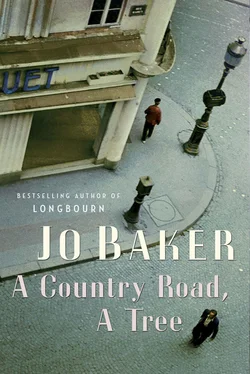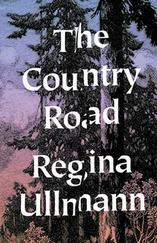“Hey!” the carter says. “What are you doing?”
“Get down.”
The narrow flickering lights are here. Cheek on mulch, an arm over his head, he feels his chest press against the ground with each breath.
The light races over them. The trees are suddenly green. Headlamps ripple over trunks, silhouette the grasses, make wickerwork of the branches and twigs. The ground shakes. The air is full of noise. Light strokes across the donkey’s flank. He sees a blue sleeve, a red scarf, a curve of balding moleskin and the grey haze of hand-sharpened steel. He knows that type of knife. It’s a vineyard pruning blade. If the donkey struggles up, he’ll cut her throat.
Grit sprays sideways from underneath the peeling tyres. He closes his eyes; he turns his face aside. The noise of the trucks is massive. Lights flash across his closed lids in red striations. And then the noise is fading, and the trucks are gone, and it is over.
He opens his eyes and watches the red tail-lights of the final vehicle. Time ticks on and the lights diminish. And that’s it. It turns out that they go on living after this.
“You are a right bastard,” the carter’s saying.
The other fellow straightens himself out. The donkey stumbles upright too, unfolding like a card-table. She shakes out her stubby mane and stumbles away a few paces, and stands there with her back to them and craps on to the woodland floor. The blade is closed and slipped away.
“Who’d have pulled my fucking cart? I’d be ruined.” The carter’s dusting off his trousers.
The other fellow just looks out after the vehicles. “Heading north,” he says, frowning, speculative. The lights shrink, and the darkness swells and closes over them, soft as ink.
The carter, muttering, goes off to retrieve and console the donkey. The other fellow turns to the cart.
He follows. He wipes his face. He notices that his hands are shaking.
“All right, then,” the other fellow says. “Let’s get our explosives and get out of here.”
—
The carter rolls away, muttering curses. They pick their way through the trees, the crate slung between them as they walk. It is heavy. But it’s differently heavy to, say, bricks or apples or flour. Out in the fields now, and the moon is up; the countryside is blue and beautiful. But all he can look at is the crate, as it swings there just in front of him like a little coffin.
It could blow them both sky-high. It could blow them into bloody rain. It is a giddy feeling, vertiginous.
Back at the little house, they stow the crate in the dark hallway. It’ll do there till morning, when he’ll find somewhere better for it. He wipes his hands down his trousers. The other fellow slopes off into the dark; he closes the door on the strangeness of the night.
Indoors, it is as much as he can do to pull off his boots. In stockinged feet he climbs the stairs as though they are a mountainside. He falls into bed. She stirs and half wakes.
“Where have you been?”
“Go back to sleep.”
“Where have you been, though?”
“Nowhere.”
“Tsk.”
“No, really. I don’t know.”
She turns on her side, drops back into sleep. He lies on his back, looking up into the darkness as it fades to morning.
—
Suzanne has been growing geraniums in pots. Miss Beamish gave her the cuttings. The flowers are wafer white, blood-clot red and blister pink — they spread their leaves like magician’s hands and are taking over the terrace. So he lifts a pot and sets it gently down on top of the crate, and slides another couple of plants in front of it too. He steps back to consider the effect, his back pressed against the railing. It’s still quite clearly and obviously a crate; there’s no escaping that. The question is, does it appear to be a benign and innocent empty old crate, the kind of crate on which one might arrange a pleasing display of potted plants, or does it still, geraniums or no geraniums, appear to be what it indeed is — a crate replete with violence, a crate stuffed tight with enormity, chock full of the potential to blow them in all directions at once?
He tilts his head. Considers it. The latter, he decides.
But then it would, because he knows.
From indoors a child’s voice sings out her scales, the notes clear and piercing. She has a good singing voice, the kid from the quincaillerie, the kind of pure voice that brings goosebumps to your arms. She’d have to leave if she wanted to do anything about it. And where would you go now? Paris? Berlin? London?
It’s a pain that Suzanne can’t take the lessons up at Saint-Michel, where there is a piano. But Yvonne can’t stand the coming and the going any more. Her nerves are shot.
He shuffles another pot along with a foot, then crouches down to tease out the leaves.
“What are you doing?” Suzanne squints out at him through the terrace doors, and then at the flowerpots and the new, conspicuous crate. “What’s going on?” Left unsupervised, the child’s voice lingers on a note, and then drops, and halts. “Are you gardening ?”
“No.”
She steps through and closes the glass door behind her, so that she is outside with him on the terrace. Down on the street below, an old woman with a headscarf and basket stares up at them. Suzanne raises a hand. The woman is obliged to return the wave and walk on. Then Suzanne turns back to him, and her smile is gone.
“Don’t give me any of your old slush. What’s in the box?”
“Nothing.”
“Nothing?”
“Nothing. Anyway, it won’t be here for long.”
“If it’s nothing, why does it need to be here at all?”
“I was going to put it under the bed, but I thought you wouldn’t like that.”
“Why?”
“Look, don’t worry about it. It’ll be fine. It’s only for a few days.”
“I didn’t ask how long it’s staying. I asked you what it is, and why it’s on our terrace.”
“It has to be kept safe and dry.”
Suzanne’s face freezes. The girl’s head appears between the curtains. Suzanne waves her furiously back: the child drops the fabric, disappears.
“Name of God—” She speaks low, furious, her eyes narrow and hard. “You don’t have the sense that you were born with, do you? What’s in the box?”
“They needed somewhere to store it.”
“Do you even know?”
Then Henri swings into view, coming back into town from his lesson with Miss Beamish. Suzanne turns away to hide her fury, but does not leave, while he raises a hand in greeting and Henri stops in the street and they lob words up and down between them. She stays put, arms folded, and waits it out. Henri ambles off with a wave and a cheery promise of drinks.
“You’re not leaving it here,” she says, as soon as Henri’s gone.
Down at the end of the garden, there’s a hollow in the bank, almost a cave. He can’t keep such a close eye on the crate there, but it’s well out of the way, and it’s dry. He bends to shift the potted plants aside. He lifts the crate and staggers sideways past her, back into the house.
“Just coming through,” he says, to her outraged glare.
The child stands, big-eyed and silent, uncomprehending, her fingers spread on the edge of the tabletop. He raises his eyebrows at her. Suzanne snaps, “Carry on!” and chivvies him towards the back door. She opens it for him. The child opens her lips and fills her lungs and climbs her way up the scale again.
He goes through the doorway gingerly. She speaks in English, because of the child. Suzanne’s English is limited and brittle; it can’t last for long.
“What, after all, is in the box?” she asks.
The English word is too close to the French, so he says it quietly. “Explosives. Sorry.”
Читать дальше










